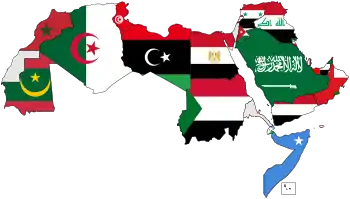Flag of Morocco
The flag of Morocco (Arabic: علم المغرب; Berber languages: ⴰⵛⵏⵢⴰⵍ ⵏ ⴰⵎⵔⵔⵓⴽ) is a red field with a green emerald pentagram.
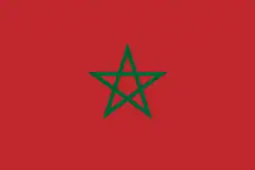 | |
| Use | National flag and state ensign |
|---|---|
| Proportion | 2:3 |
| Adopted | November 17, 1915 |
| Design | A red field with the green pentagram, a five-pointed linear star. |
| Designed by | Mulay Yusef |
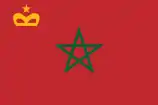 Variant flag of Kingdom of Morocco | |
| Use | Civil ensign |
| Proportion | 2:3 |
| Design | With a yellow one-starred crown in the canton. |
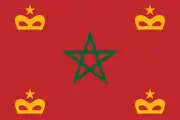 Variant flag of Kingdom of Morocco | |
| Use | Naval ensign |
| Proportion | 2:3 |
| Design | With a yellow one-starred crown in each corner. |
Red has considerable historic significance in Morocco, proclaiming the descent from royal Alaouite dynasty. This ruling house was associated with the Islamic prophet Muhammad via Fatimah, the wife of Ali, the fourth Muslim Caliph. Red is also the color that was used by the sharifs of Mecca and the imams of Yemen. From the 17th century on, when Morocco was ruled by the Alaouite dynasty, the flags of the country were plain red.
On November 17, 1915, Resident General Hubert Lyautey had Sultan Yusef sign a dhahir that made Morocco's flag red with a green interlaced pentangle.[1] The five points of the star stand for Love, Truth, Peace, Freedom, and Justice. While Morocco was under French and Spanish control, the red flag with the seal in the center remained in use, but only inland. Its use at sea was prohibited. When independence was restored in 1956, it once again became the national flag.
The red background on the Moroccan flag represents hardiness, bravery, strength and valour, while the green represents love, joy, wisdom, peace and hope;[2][3] it also represents the color of Islam and the pentagram represents the seal of Solomon.[4] The five branches also represent the pillars of Islam.
Colours
The colors approximation is listed below:
(1915-present) | Red | Green |
|---|---|---|
| RGB | 193-39-45 | 0-98-51 |
| Hexadecimal | #c1272d | #006233 |
| CMYK | 0, 80, 77, 24 | 100, 0, 48, 62 |
| Pantone | 7620 C | 3425 C |
History
To be known from this book, may God uphold its value and to be around the centre of grace and joy its orbit, that due to the promotion of our Cherifian kingdom affairs, the spread of its glory and its pride, the need to assign a flag that distinct it from the rest of the kingdoms as that our sacred ancestors flag use to be very similar to some other flags especially the ones used in the marine signs, our noble vision decided to distinct our joyful flag by making the five pointed seal of Solomon in the middle in green, asking the almighty god to keep it waving with the winds of fortune and ambition for this time and the becoming, Amen and peace.
In accordance with the seventh article of the constitution, the emblem of the Kingdom shall be a red flag with a five-pointed green star in the center.
The flag shall be made with fabric of canna red, opaque and rectangular in shape. The star shall be open, green like the leaf of palm trees, made of five continuous branches and woven in the same fabric where it must be visible on both sides of the flag. One of its points must point upwards. The hoist [vertical dimension of a flag] of the flag equals two thirds (2⁄3) of its fly [horizontal length of a flag]. The star is inscribed in an invisible circle whose radius equals one sixth (1⁄6) of the flag's fly [horizontal length of a flag] and whose centre is the intersection point of the invisible diagonal lines of the flag's rectangular.
The width of each one of the branches of the star shall be 1⁄20 of its length.
.
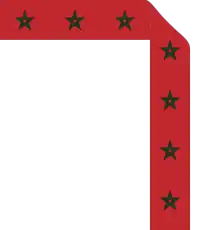
On May 8, 2010, a Moroccan flag with a size of 60,409.78 square metres (650,000 sq ft; 14.9 acres), weighing 20,000 kilograms (22 short tons), was set in Dakhla, a city in the disputed territory of Western Sahara. It was certified by the Guinness Book of World Records as the largest flag ever draped.[5]
Historical national flags
_(1258_1659).svg.png.webp) Flag of Morocco (Idrisid dynasty), 780–974
Flag of Morocco (Idrisid dynasty), 780–974 Flag of Morocco (Almoravid dynasty), 1070–1147
Flag of Morocco (Almoravid dynasty), 1070–1147.svg.png.webp) Flag of Morocco (Almohad dynasty), 1147–1248
Flag of Morocco (Almohad dynasty), 1147–1248.svg.png.webp)
.svg.png.webp) Flag of Morocco, 1666 to 1915.
Flag of Morocco, 1666 to 1915. Flag of Morocco, 1915–present
Flag of Morocco, 1915–present
Other historical flags
_variant.svg.png.webp) Flag used in the 19th century
Flag used in the 19th century
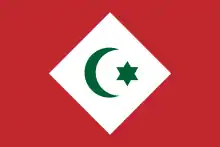 Flag of Republic of the Rif (1921–1926)
Flag of Republic of the Rif (1921–1926) Merchant flag of French protectorate in Morocco (1919-1946)[9]
Merchant flag of French protectorate in Morocco (1919-1946)[9]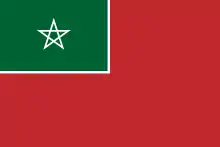 Merchant flag of Spanish protectorate in Morocco (1937-1956)[10]
Merchant flag of Spanish protectorate in Morocco (1937-1956)[10]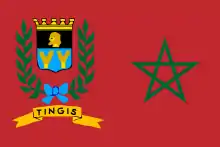 Flag of the Tangier International Zone (1953-1957)[11]
Flag of the Tangier International Zone (1953-1957)[11]
Other national flags
 Civil Ensign
Civil Ensign Naval Ensign
Naval Ensign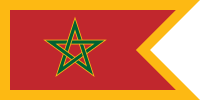 Naval Jack
Naval Jack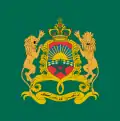 Royal Standard
Royal Standard Royal Flag
Royal Flag
References
- "La fabuleuse histoire des drapeaux marocains". Le Desk. Retrieved 2019-07-22.
- "Flag of Morocco". Famouswonders.com. 1915-11-17. Retrieved 2016-07-03.
- "Moroccan Flag". M.vexillologymatters.org. Retrieved 2016-07-03.
- page 838
- "Archived copy". Archived from the original on July 19, 2011. Retrieved July 24, 2010.CS1 maint: archived copy as title (link)
- Wyrtzen, Jonathan. Making Morocco: Colonial Intervention and the Politics of Identity. Cornell University Press. p. 81. ISBN 978-1-5017-0425-3.
- Martin, Rupert (1967). The Land and People of Morocco. Black. p. 20. ISBN 978-0-02-762430-4.
The latter, a six-pointed star of two interlaced triangles, is found in magic all over the world, and is actually used as the centre of the Moroccan national flag. There are many stories about the magic of Solomon recorded in the Koran.
- Kay, Shirley (1980). Morocco. Namara Publications. p. 91. ISBN 978-0-7043-2224-0.
and the six-pointed star, the Seal of Solomon, a symbol used in ceremonial rites throughout the world and indeed the symbol of the Kingdom of Morocco itself, woven in green on a red background in the country's flag.
- Flags of the world: French Protectorate of Morocco
- Flags of the world: Spanish Protectorate of Morocco
- Flags of the world: International Zone of Tangiers
http://www.moroccotomorrow.org/the-moroccan-flag-moorish-americans-an-historical-perspective-frost/
